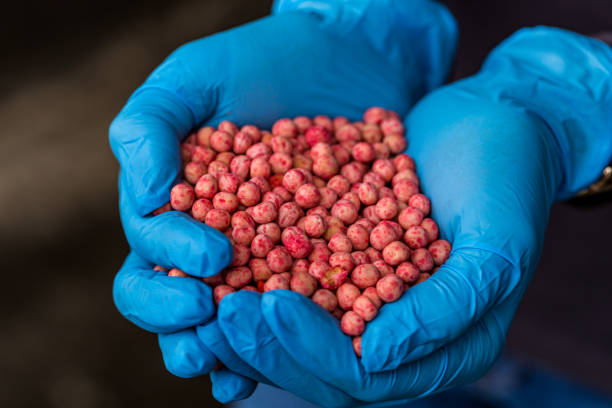The Seed Treatment Market refers to the agricultural practice of treating seeds with various substances, such as pesticides, fungicides, insecticides, and other chemicals, to protect them from pests, diseases, and environmental stressors. Seed treatment is an essential part of modern agriculture because it helps improve crop yields, enhance plant health, and reduce the need for chemical applications later in the growing season.
For free sample click the below link:
https://www.prophecymarketinsights.com/market_insight/Insight/request-sample/362
Key Highlights:
- Growing Demand for Food Security: The seed treatment market is driven by the increasing global population and the need to enhance food production. Seed treatments help optimize crop yields, contributing to global food security.
- Environmental Sustainability: Seed treatment methods are evolving to align with environmental concerns and regulations. There is a shift toward more sustainable and eco-friendly seed treatment options to reduce the environmental impact of agriculture.
- Technological Advancements: Advances in seed treatment technologies enable precise and efficient delivery of pesticides, fungicides, and other treatments to seeds, improving crop protection and yield potential.
- Biological Solutions and Regulation: The use of biological agents and the tightening of regulations on chemical usage in agriculture are shaping the seed treatment market. Biological seed treatments and sustainable practices are gaining traction as a more environmentally friendly approach.
Key factors and trends in the seed treatment market include:
- Increasing Global Population: With the world’s population continually growing, there is a rising demand for food production. Seed treatment can help optimize crop yields, making it a crucial component of global food security.
- Crop Protection: Seed treatments protect crops from pests, diseases, and adverse weather conditions. They can prevent the need for excessive pesticide applications, reducing environmental impact and costs for farmers.
- Technological Advancements: Advances in seed treatment technologies have made it more efficient and precise. Modern seed treatment methods can deliver chemicals directly to the seed, ensuring better coverage and effectiveness.
- Environmental Concerns: There is a growing awareness of the environmental impact of agricultural practices. Seed treatments that minimize chemical usage and runoff can help address these concerns.
- Regulations and Sustainability: Governments and regulatory bodies are imposing stricter regulations on chemical usage in agriculture. This has led to the development of more environmentally friendly seed treatment options.
- Biological Seed Treatments: There is a growing interest in using biological agents, such as beneficial microbes and natural compounds, as seed treatments. These are considered more sustainable and less harmful to the environment.
- GM Seed Treatments: Genetically modified (GM) crops often come with built-in resistance to pests and diseases. This has reduced the need for some seed treatments in certain crops.
- Market Players: The seed treatment market includes several major players in the agricultural chemical industry, such as Bayer CropScience, Syngenta, BASF, Corteva Agriscience, and others. These companies invest heavily in research and development to create innovative seed treatment solutions.
- Regional Variations: The demand for seed treatment varies by region based on crop types, environmental conditions, and regulatory factors. Regions with large-scale commercial agriculture, such as North America and parts of Asia, tend to have a significant seed treatment market.
- Crop Diversity: Seed treatments are used for a wide range of crops, including corn, soybeans, wheat, cotton, and more. The choice of seed treatment products and methods can vary depending on the specific crop and its susceptibility to pests and diseases.

For free pdf click the below link:
https://www.prophecymarketinsights.com/market_insight/Insight/request-pdf/362
Segmentation:
- By Crop Type: Cereals & Grains, Sugar Beets, Alfalfa, Oil Seeds, Sugarcane, and Vegetables
- By Treatment Type: Chemical Treatment and Non-Chemical Treatment
- By Application: Insecticides, Fungicides, Herbicides, Fertilizers, and Bio-Control
- By Region: North America, Europe, Asia Pacific, Latin America, Middle East, and Africa
Key Players:
Key players operating in the global seed treatment market includes Syngenta AG, Bayer AG, Nufarm Limited, BASF S.E., Monsanto Company, DowDuPont Inc., Sumitomo Chemical Company, Limited, Albaugh, LLC, FMC Corporation, and Lanxess AG.
Related Reports:
About Prophecy Market Insights:
Prophecy Market Insights is specialized market research, analytics, marketing/business strategy, and solutions that offer strategic and tactical support to clients for making well-informed business decisions and to identify and achieve high-value opportunities in the target business area. We also help our clients to address business challenges and provide the best possible solutions to overcome them and transform their business.
To know more
Contact Us:
Sales
Prophecy Market Insights
📞+1 860 531 2574
✉ Email– sales@prophecymarketinsights.com
🌐 Website- www.prophecymarketinsights.com
🌐Blog- www.prophecyjournals.com
Follow us on: